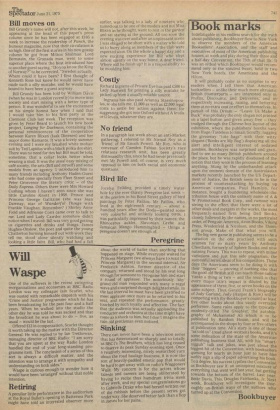Book marks
Indefatigable in his endless search for the truth about publishing, Bookbuyer flew to New York to observe the members of the American Booksellers' Association, and the staff and executives of most of the American publishing houses, at work and play during their three and a half-day Convention, the 75th of that Ilk. It was an ordeal which Bookbuyer would recommend only to the stoutest heart, held in two New York hotels, the Americana and the Hilton.
It will probably come as no surprise to my readers when I tell them that American booksellers — unlike their much more altruistic British counterparts — are interested only in Profits, Discounts, and Deliveries, and in respectively increasing, raising, and bettering them at no extra cost or effort to themselves. In pursuit of this Dream — "Leave Us Make a Buck" was probably the only slogan not printed on a lapel button and given away free — they trudged through the Chinese-box layout of the exhibition, where the publishers' booths vary from Huge/Tasteless to Small/Scruffy, lugging the giveaway "tote bags" with their witty slogans ('Books are My Bag') displaying all the alert and intelligent interest of sedated zombies. Bookbuyer was surprised and gratified to see so many British publishers around the place, but he was rapidly disabused of the notion that they were in the process of learning anything. Stung by the underhanded attack upon the eminent domain of the Australasian markets recently launched by the US Department of Justice, the British seem to be in the process of counterattacking by buying up American companies. Paul Hamlyn, for instance, bought a foundering wholesale/distribution house with the unlikely name of A & W Promotional Book Corp., and rumour was strong to the effect that there were a lot of other deals and mergers in the works, the most frequently-named firm being Dell Books, closely followed by the names, in no particular order, of Penguin America, Avon Books, Viking Press, Weidenfeld & Nicolson, and the Thomson group. Make of that what you will.
The big new game in publishing seems to be a variation on the one practised with such acumen for so many years by Anthony Cheetham, formerly of Sphere Books and now running Futura. This was to repeat, with minor variations and just this side plagiarism, the successful series ideas of his competitors. These days the Americans seem to be doing it with their "biggies" — proving if nothing else that the good old British still can teach those callow Yanks a thing or two — and the result is that every major title's impact is diluted by the appearance of three, five, or seven books on the same subject. Thus, Gerald Frank's biography of Judy Garland, Judy (Harper & Row) will be competing with (by Bookbuyer's count) at least five other books about this vastly overrated performer. Same rules apply to the typicallymodestly-titled The Greatest, the autobiography of Muhammad Ali which is to be published by Random House, and will be accompanied in the shops by four or five others at publication time. Ali's story is one of those "as told to" (read ghost-written) books, and it's some indication of the state of the American publishing business that Ali, with his "smartnigguh" talk and jokes, was just about the biggest hit of the Convention, with booksellers queuing for nearly an hour just to have him surlily sign a slip of paper advertising his book. To a degree, his success typifies the Convention as Bookbuyer saw an uninspired mixture of everything that went well last year, but getting towards the bottom of the barrel. Last year, Bette Davis. This, Douglas Fairbanks, Jr. Next week, Bookbuyer will investigate the thoroughly un-British ways of the authors who turned up at the Convention.
• Bookbuyer


































 Previous page
Previous page